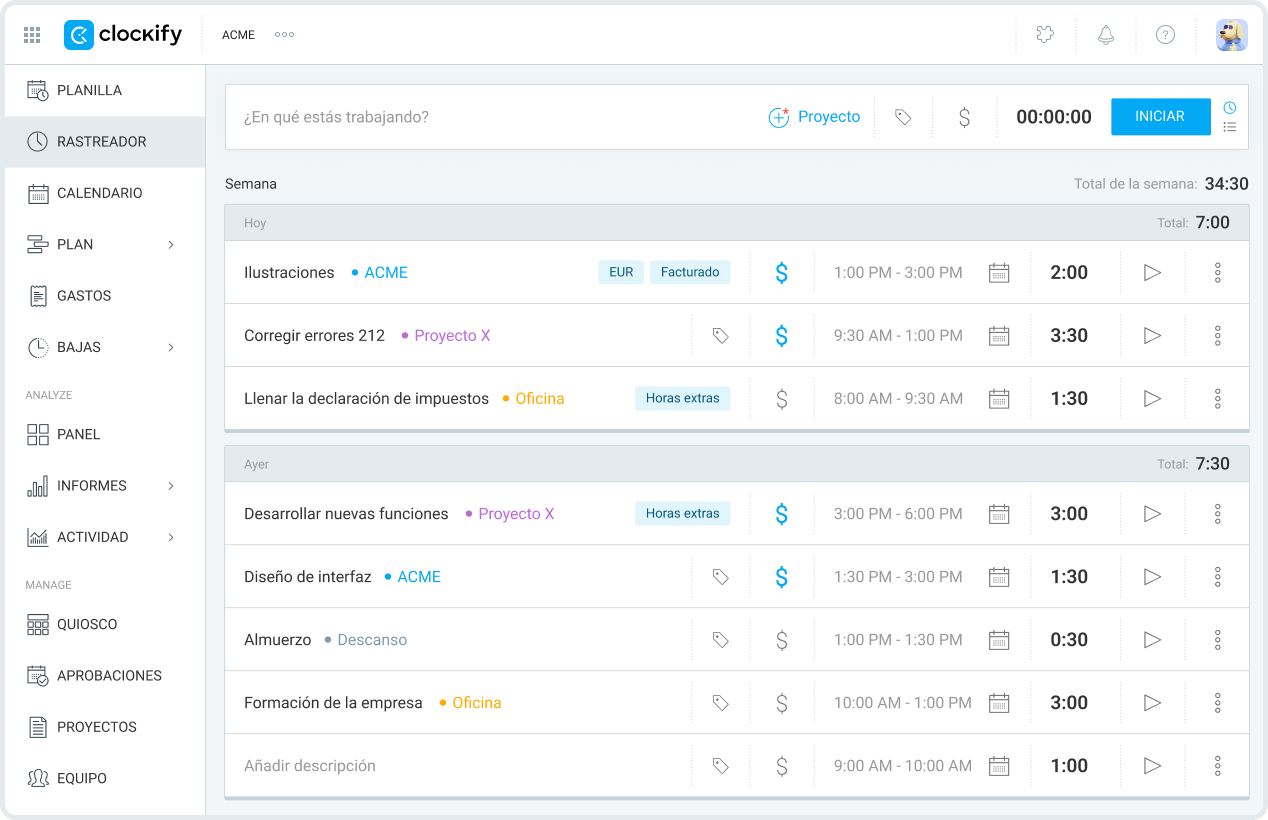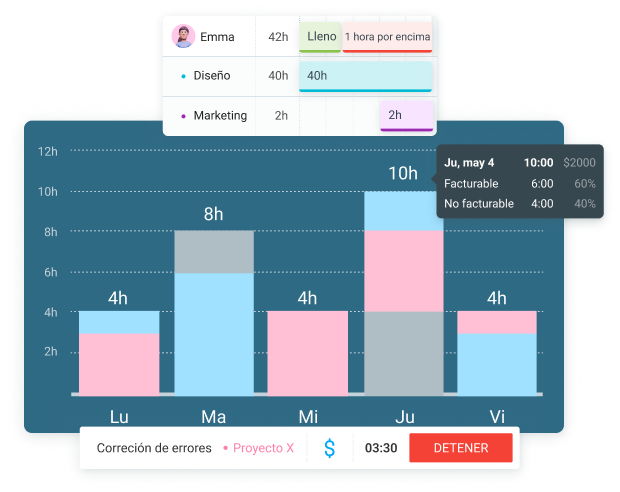Uno de los criterios principales para clasificar a los empleados es determinar si están exentos o no exentos. Esta clasificación especifica si un empleado está cubierto por la Ley de Normas Justas de Trabajo (FLSA, por sus siglas en inglés) en términos de salario mínimo y pago de horas extras.
Los empleados clasificados como "exentos" no están cubiertos por las regulaciones de salario mínimo y horas extras de la FLSA, mientras que la ley cubre a los empleados "no exentos".
Algunos tipos de empleados solo pueden estar exentos de las regulaciones de horas extras, mientras que otros pueden estar exentos del salario mínimo, o tanto de las reglas de salario mínimo como de las de horas extras. Además, algunos empleados también pueden estar exentos de las disposiciones sobre trabajo infantil.
En este artículo, analizaremos en detalle la diferencia entre empleados exentos y no exentos y te ayudaremos a clasificarlos correctamente de acuerdo con la FLSA.

- Los empleados exentos suelen recibir un salario y se consideran exentos de las disposiciones de horas extras de la FLSA.
- Los empleados no exentos suelen recibir un salario por hora y están cubiertos por las disposiciones de la FLSA sobre salario mínimo y horas extras.
- La FLSA incluye varias categorías de trabajo que se consideran exentas, como empleados ejecutivos, administrativos o profesionales.
- Para que un empleado califique para la exención ejecutiva, administrativa o profesional de la FLSA, debe ganar un salario de al menos $844 por semana.
- Algunos estados tienen su propio umbral salarial para el estado de exención.
- Existen diferentes requisitos de mantenimiento de registros para empleados exentos y no exentos.
¿Qué significa "exento"?
La frase “exento” se refiere a alguien que está libre de una obligación o responsabilidad.
Debemos mencionar que “exención” y “excepción” tienen dos significados diferentes. Exención se refiere a alguien que está libre de ciertas obligaciones y privilegios, mientras que excepción se refiere a algo o alguien que no se ve afectado por una regla en particular.
¿Qué es un empleado exento?
Los empleados exentos son aquellos que no son elegibles para las disposiciones de salario mínimo y horas extras de la FLSA. Esto significa que los empleados exentos no tienen derecho al salario mínimo federal de $7,25 por hora ni a la tarifa de horas extra de 1,5 veces la tarifa de pago regular.
La razón por la que estos empleados están exentos es principalmente porque:
- Reciben un salario fijo cada mes,
- Trabajan en campos que requieren conocimientos avanzados,
- Se los considera empleados altamente remunerados y otras razones.
El hecho de que un empleado esté exento o no exento se determina individualmente, y tanto el empleado como el empleador deben verificar los términos y condiciones de cada exención. Sin embargo, la responsabilidad de cada exención recae en el empleador.
Ejemplos de empleados exentos
La FLSA tiene muchas categorías de trabajadores que pueden considerarse exentos.
A continuación, se muestran algunos ejemplos de ocupaciones exentas:
- Abogados,
- Ingenieros,
- Trabajadores de temporada,
- Vendedores,
- Arquitectos,
- Médicos, y
- Maestros.
Empleados exentos: ventajas y desventajas
Aunque los empleados exentos no son elegibles ni para el salario mínimo ni para el pago de horas extras, existen ciertos beneficios para este tipo de empleo. Veamos las ventajas y desventajas de ser un empleado exento en la siguiente tabla.
| Ventajas ✅ | Desventajas ❌ |
|---|---|
| Ingresos constantes — los empleados exentos suelen ser empleados a tiempo completo a los que se les paga un salario fijo, lo que les da un ingreso mensual estable y seguro. | Sin cobertura de la FLSA — los empleados exentos no son elegibles para las disposiciones de salario mínimo ni de horas extras según la FLSA. Debido a esto, no reciben una compensación adicional por el trabajo de horas extra. |
| Desarrollo profesional — muchos empleados exentos trabajan en ocupaciones que requieren conocimientos avanzados (por ejemplo, gerentes, trabajadores informáticos y maestros), lo que les brinda más oportunidades de desarrollarse y crecer. | Presión adicional — debido a que los empleados exentos trabajan en puestos de mayor jerarquía, se espera que rindan al máximo de sus capacidades. Esto puede causar mucha presión, ya que las empresas dependen en gran medida de estos empleados. |
| Beneficios para el empleador — ciertos empleados pueden incluir beneficios para sus empleados como parte de su empleo. Algunos de estos beneficios incluyen: planes de pensión, bonificaciones, programas de atención médica, vacaciones pagadas y bajas por enfermedad y programas de jubilación 401(k). |
¿Qué es un empleado no exento?
Los empleados no exentos son aquellos que son elegibles para las disposiciones de salario mínimo y horas extras de la FLSA. Esto significa que a los empleados no exentos se les garantiza un salario mínimo federal de al menos $7,25 por hora.
Además, a los empleados no exentos se les garantiza el pago de horas extras por trabajar más de 40 horas a la semana y 8 horas al día. Dichos trabajadores deben recibir un pago de horas extras de 1,5 veces su tarifa de pago regular por cada hora extra trabajada.
Aunque a los empleados no exentos a menudo se les paga por hora, a veces se les puede pagar un salario o una comisión.
🎓 Controla las horas extras con Clockify
Ejemplos de empleados no exentos
La ley federal no incluye una lista de empleados no exentos, y muchas categorías de empleados pueden ser elegibles para este tipo de empleo.
A continuación, se muestran algunos ejemplos comunes de empleados no exentos:
- Plomeros,
- Trabajadores de la construcción,
- Agentes de atención al cliente,
- Oficiales de policía, bomberos y otros socorristas,
- Trabajadores minoristas, y
- Trabajadores de fábricas.
Empleados no exentos: ventajas y desventajas
Veamos las ventajas y desventajas de ser un empleado no exento en la siguiente tabla.
| Ventajas ✅ | Desventajas ❌ |
|---|---|
| Pago garantizado de horas extras — según la ley federal, a los empleados con más de 40 horas trabajadas en una semana laboral se les garantiza un pago adicional. Este pago equivale a 1,5 veces su tarifa de pago regular por cada hora que exceda las 40. | Salario más bajo — a los empleados no exentos generalmente se les paga un salario por hora que puede ser menor que el salario que reciben los empleados exentos. A muchos trabajadores no exentos se les paga un mínimo federal de $7,25 por hora. |
| Horarios variados — los empleados no exentos suelen trabajar en varios turnos, lo que puede resultar beneficioso a la hora de planificar el tiempo libre. Además, como realizan tareas sencillas, pueden intercambiar turnos fácilmente con otros empleados. | Desarrollo profesional limitado — la mayoría de los empleados clasificados como no exentos trabajan en ocupaciones de trabajo manual y realizan tareas sencillas. Debido a esto, es difícil desarrollar sus carreras y alcanzar clasificaciones más altas. Sin embargo, algunos empleados no exentos, como los socorristas, pueden alcanzar clasificaciones más altas y hacer crecer sus carreras. |
Exenciones de la Ley de Normas Justas de Trabajo (FLSA)
En esta sección, analizaremos más de cerca las exenciones de la Ley de Normas Justas de Trabajo (FLSA), que incluyen:
- Exención de empleados ejecutivos, administrativos y profesionales,
- Exención de empleados de ventas a comisión pagados por establecimientos minoristas,
- Exención de profesiones relacionadas con la informática y otras.
🎓 Lista completa de exenciones de la FLSA
Exención para empleados ejecutivos, administrativos y profesionales
La exención más común de la FLSA para horas extras y salario mínimo cubre a los empleados ejecutivos, administrativos o profesionales (EAP).
Para calificar para dicho estado exento, un empleado debe cumplir con los siguientes 3 criterios:
- Deben ser empleados asalariados,
- Deben recibir al menos el umbral salarial mínimo especificado de al menos $844 por semana, y
- Deben realizar tareas ejecutivas, administrativas o profesionales.
Además, el Departamento de Trabajo de EE. UU. también tiene una prueba alternativa para empleados altamente remunerados que califican para la exención si ganan al menos $132,964 por año.
En abril de 2024, el Departamento de Trabajo de EE. UU. declaró una regla final con respecto al nivel salarial estándar para empleados ejecutivos, administrativos, profesionales, de ventas externas y de informática. El 1 de julio de 2024, esta regla aumentó el umbral salarial de $684 a $844 por semana.
El nivel salarial aumentará nuevamente el 1 de enero de 2025, y crecerá hasta un mínimo de $1128 por semana. Después de eso, aumentará el 1 de enero de 2027 y está previsto que aumente cada 3 años para ajustarse a las crecientes tasas de inflación.
En el caso de los empleados con salarios altos, su umbral salarial anual también aumentará, pasando de $132,964 a $151,164 por año a partir del 1 de enero de 2025.
Exención para empleados de ventas a comisión pagados por establecimientos minoristas
Los empleados que trabajan en establecimientos minoristas y reciben un pago a comisión están exentos del pago de horas extras si más de la mitad de sus ganancias provienen de comisiones.
Para que un empleado califique para el estado exento, debe cumplir con los siguientes 3 criterios:
- Debe trabajar en un establecimiento minorista o de servicios,
- Su tarifa de pago regular debe ser superior a 1,5 veces el salario mínimo estándar por cada hora extra, y
- Más de la mitad de sus ganancias en un período de pago deben provenir de comisiones.
Para calcular las ganancias de los empleados en consecuencia, los empleadores deben mantener ciertos registros, como el número total de horas de trabajo, las ganancias y los salarios.
Exención para profesiones relacionadas con la informática
Los empleados que trabajan como analistas de sistemas, programadores, desarrolladores de software o en cualquier puesto similar están exentos de las disposiciones sobre horas extras y salario mínimo si ganan al menos $27,63 por hora.
Para que un empleado sea elegible para este tipo de exención, debe cumplir con los siguientes 3 criterios:
- Debe recibir un salario y ganar al menos $27,63 por hora,
- Debe trabajar como programador, desarrollador de software o cualquier otro trabajador con habilidades similares en el campo de la informática, y
- Sus funciones principales deben incluir:
- Aplicación de análisis y procedimientos de sistemas,
- Diseño, desarrollo, investigación, modificación, creación o prueba de software de ordenador,
- Diseño, documentación, prueba, creación o modificación de sistemas operativos, o
- Cualquier combinación de las funciones anteriores.
Esta exención no se aplica a los empleados que fabrican o reparan hardware de ordenador o equipo relacionado.
Otras exenciones de la FLSA
La lista de exenciones de la FLSA es extensa, por lo que hemos incluido algunas exenciones adicionales en una tabla. La tabla incluye categorías de empleados exentos de horas extras, salario mínimo o ambos (❌ = no exento; ✅ = exento).
| Tipo de empleado | Salario mínimo | Pago de horas extras |
|---|---|---|
| Conductores, cargadores o mecánicos | ❌ | ✅ |
| Empleados que trabajan en granjas | ✅ | ✅ |
| Trabajadores de temporada | ✅ | ✅ |
| Niñeras | ✅ | ✅ |
| Trabajadores de aerolíneas | ❌ | ✅ |
| Empleados con discapacidades | ✅ | ❌ |
| Investigadores criminales federales | ✅ | ✅ |
| Bomberos en departamentos pequeños | ❌ | ✅ |
| Trabajadores de pesca | ✅ | ✅ |
| Acompañantes de mayores | ✅ | ✅ |
| Empleados de cine | ❌ | ✅ |
| Empleados de reparto de periódicos | ✅ | ✅ |
| Agentes de policía en departamentos pequeños | ❌ | ✅ |
| Trabajadores ferroviarios | ❌ | ✅ |
| Conductores de taxi | ❌ | ✅ |
| Operadores de centralita | ✅ | ✅ |
Ten en cuenta que puedes comunicarte con tu Oficina Distrital de Salarios y Horas de Trabajo local para solicitar cualquiera de las exenciones mencionadas anteriormente.
Exenciones estatales
Todas las exenciones mencionadas anteriormente se encuentran en la FLSA. Sin embargo, algunos estados tienen sus propios requisitos salariales para clasificar a los empleados como exentos o no exentos, y estos estados generalmente exigen un salario más alto que el gobierno federal.
En este momento, solo algunos estados tienen estas leyes vigentes, pero se espera que muchos otros estados puedan establecer sus propios umbrales salariales en el futuro.
| Estado | Ley estatal |
|---|---|
| Alaska | Para calificar para la exención del salario mínimo y las horas extras para ejecutivos, administrativos o profesionales, los empleados deben ganar un salario de al menos $938,40 por semana. |
| California | Los empleados deben ganar al menos $66,560 al año para calificar para la exención de horas extras. Además, el umbral salarial estándar para la exención de profesiones relacionadas con la informática es de al menos $55,58 por hora. |
| Colorado | El umbral salarial estándar para que los empleados califiquen para la exención es de al menos $1057 por semana. En cuanto a los profesionales de la informática, el umbral salarial es de $31,41 por hora. |
| Washington | Washington Washington también tiene su propio umbral salarial para la exención de horas extras, y difiere entre pequeñas y grandes empresas. Los empleados deben ganar al menos $1302,40 por semana para calificar para una exención, independientemente del tamaño de la empresa. A partir de 2025, este umbral aumentará anualmente, creciendo a $1337,60 para pequeñas empresas y $1504,80 para grandes empresas. |
| Nueva York | El estado de Nueva York tiene su propio umbral salarial, que varía entre ciudades. La ciudad de Nueva York, Nassau, Suffolk y el condado de Westchester requieren que los empleados que trabajan en ocupaciones administrativas y ejecutivas ganen al menos $1200 por semana para calificar para la exención. Por otro lado, los empleados que trabajan en el estado de Nueva York deben ganar al menos $1124,20 por semana para calificar para la exención mencionada anteriormente. |
Requisitos de mantenimiento de registros para empleados exentos y no exentos
Los empleados exentos y no exentos también difieren en lo que respecta a ciertos requisitos de mantenimiento de registros. Como los empleados exentos son principalmente empleados asalariados, la ley federal no es demasiado estricta para los empleadores.
Los empleadores que emplean empleados exentos deben mantener los siguientes registros:
- Deberes semanales,
- Inicio y fin de la semana laboral,
- Salarios del empleado,
- Información personal sobre el empleado (por ejemplo: nombre, dirección, número de seguro social),
- Fechas de pago, e
- Información del período de pago.
Por otro lado, los empleadores que emplean empleados no exentos deben cumplir requisitos de mantenimiento de registros más estrictos, que incluyen:
- Información personal sobre el empleado (por ejemplo: nombre, dirección, número de seguro social),
- Inicio y finalización de cada día laboral,
- Fecha de pago,
- Información del período de pago,
- Base sobre la cual se le paga al empleado (por ejemplo, tarifa por hora),
- Ganancias por horas extras,
- Salarios por cada período de pago,
- Pago adicional al empleado,
- Ganancias por día,
- Número total de horas de trabajo, y
- Las deducciones.
Los empleadores deben guardar los registros de nómina mencionados anteriormente durante un período de al menos 3 años.
🎓 Controla las horas de trabajo de los empleados con Clockify
Preguntas frecuentes sobre empleados exentos y no exentos
Para que este artículo sea lo más completo posible, hemos incluido una sección de preguntas frecuentes que cubre las preguntas más comunes sobre empleados exentos y no exentos.
¿Se considera al propietario de una empresa un empleado exento?
Sí, según una regla especial, los propietarios de empresas que poseen al menos el 20% de una empresa se consideran empleados ejecutivos exentos. El requisito de salario estándar no se aplica en este caso.
¿Cómo se determina si un puesto debe estar exento o no exento?
Clasificar incorrectamente a los empleados puede generar posibles consecuencias legales y demandas. Para determinar si un puesto de empleado está exento o no exento, los empleadores deben analizar 3 pruebas diferentes, que incluyen:
- Prueba de base salarial (los empleados deben recibir un salario),
- Prueba de salario (los empleados deben ganar al menos $844 por semana), y
- Prueba de funciones (los empleados deben realizar funciones ejecutivas, administrativas o profesionales).
¿Cuáles son las desventajas de ser un empleado exento?
Aunque los empleados exentos suelen recibir un salario mayor, este tipo de empleo tiene varias desventajas.
Los empleados exentos no tienen derecho al pago de horas extras, lo que significa que podrían tener que trabajar horas adicionales sin compensación.
Además, los empleados exentos tienden a trabajar en puestos de mayor rango, lo que genera presión adicional y puede provocar el síndrome de burnout.
¿Quién está exento del pago de horas extras?
Ciertas categorías de empleados se consideran exentas del pago de horas extras. Algunas de estas categorías incluyen:
- Empleados ejecutivos, administrativos o profesionales que ganan al menos $844 por semana,
- Expertos en informática que ganan al menos $27,63 por hora,
- Empleados de ventas a comisión que trabajan en establecimientos minoristas,
- Trabajadores ferroviarios,
- Taxistas y otros.
Cómo te ayuda Clockify a controlar las horas de trabajo de los empleados
Según la ley federal, los empleadores deben mantener ciertos registros de nómina para cada empleado. Uno de estos registros son las horas de trabajo del empleado.
Controlar las horas de trabajo de cada empleado puede ser abrumador y llevar mucho tiempo, y puede dar lugar a ciertos problemas legales si no se hace correctamente.
Por eso, deberías utilizar un software de seguimiento del tiempo que te ayude con todo el proceso y te permita ahorrar incontables horas y dinero. Para eso, puedes probar Clockify.
Con el rastreo del tiempo de Clockify, tus empleados pueden controlar fácilmente sus horas de trabajo con un simple clic.

Los empleados pueden simplemente anotar en qué están trabajando y poner en marcha el temporizador, o pueden introducir las horas de trabajo manualmente.
Más tarde, puedes ver todos estos datos de tiempo y hacer un seguimiento de las horas de trabajo de cada empleado individualmente sin perder incontables horas.
¿Qué estás esperando? ¡Empieza a ahorrar dinero y tiempo usando Clockify!
Cómo revisamos esta publicación: Nuestros escritores y editores monitorean las publicaciones y las actualizan cuando hay nueva información disponible, para mantenerlas frescas y relevantes. Publicado: 11 de octubre de 2024
Publicado: 11 de octubre de 2024 
